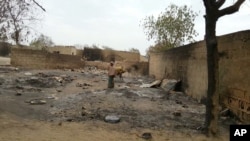ABUJA —
Residents of a northern Nigerian town are returning from hideouts in the bush after a fierce -- and deadly -- battle between suspected Islamist militants and government security forces
The fishing town of Baga sits on the northeastern edge of Nigeria, on a bit of land that juts into Lake Chad.
Residents of the town fled their homes over the weekend when fierce fighting broke out between the military and suspected militants from the radical Islamist sect Boko Haram. A local official, Lawan Kole, says the fighting destroyed about 2,000 homes and left 185 people dead.
A soldier involved in the field operations - who asked not to be named - says Boko Haram fighters are to blame for the carnage because they were operating in the town, essentially using the civilian population as a human shield.
“What happened that night was an exchange of fire between us and the rebels, terrorists," the soldier said. "It was terrible. They fired RPG canisters. That was what brought out fire.”
But some locals say the battle was out of control on both sides and that soldiers set fire to houses and chased people into the bush.
The battle is believed to have begun Friday night, but it wasn’t until Sunday before it hit the news in the Nigerian capital.
On Sunday, Borno State Governor Kashim Shettima visited Baga. The governor urged residents who were slowly returning to town to remain in their homes and vowed that if peace was not restored, he would personally relocate to Baga.
“I will ask everybody to come back to his home and stay," Shettima said. "If the harassment continues, I will personally relocate from Maiduguri to here and let me be harassed along with the rest of the people.”
Boko Haram has been battling the government since 2009, attacking churches, schools, telecom infrastructure, media houses, government offices and the local U.N. headquarters.
The crisis in Baga over the weekend represents one of the highest casualty counts for a single attack but it is not yet clear if victims were targeted or died in fires during the battle.
Boko Haram advocates for the enforcement of Islamic law in Nigeria and freedom for imprisoned members. But the group communicates with the public only through unverifiable e-mails and videos and no one is certain exactly who they are or what they represent.
Some northern community leaders have asked the government to grant amnesty to the Boko Haram fighters, in an effort to end the mounting death tolls.
The fishing town of Baga sits on the northeastern edge of Nigeria, on a bit of land that juts into Lake Chad.
Residents of the town fled their homes over the weekend when fierce fighting broke out between the military and suspected militants from the radical Islamist sect Boko Haram. A local official, Lawan Kole, says the fighting destroyed about 2,000 homes and left 185 people dead.
A soldier involved in the field operations - who asked not to be named - says Boko Haram fighters are to blame for the carnage because they were operating in the town, essentially using the civilian population as a human shield.
“What happened that night was an exchange of fire between us and the rebels, terrorists," the soldier said. "It was terrible. They fired RPG canisters. That was what brought out fire.”
But some locals say the battle was out of control on both sides and that soldiers set fire to houses and chased people into the bush.
The battle is believed to have begun Friday night, but it wasn’t until Sunday before it hit the news in the Nigerian capital.
On Sunday, Borno State Governor Kashim Shettima visited Baga. The governor urged residents who were slowly returning to town to remain in their homes and vowed that if peace was not restored, he would personally relocate to Baga.
“I will ask everybody to come back to his home and stay," Shettima said. "If the harassment continues, I will personally relocate from Maiduguri to here and let me be harassed along with the rest of the people.”
Boko Haram has been battling the government since 2009, attacking churches, schools, telecom infrastructure, media houses, government offices and the local U.N. headquarters.
The crisis in Baga over the weekend represents one of the highest casualty counts for a single attack but it is not yet clear if victims were targeted or died in fires during the battle.
Boko Haram advocates for the enforcement of Islamic law in Nigeria and freedom for imprisoned members. But the group communicates with the public only through unverifiable e-mails and videos and no one is certain exactly who they are or what they represent.
Some northern community leaders have asked the government to grant amnesty to the Boko Haram fighters, in an effort to end the mounting death tolls.





